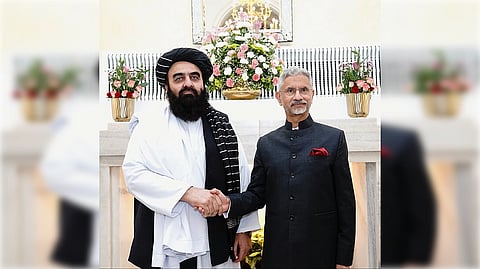
- HOME
- OPINION
- ON GROUND
- INTERVIEW
- INDIA
- NewsGram USA
- WORLD
- न्यूजग्राम
- POLITICS
- ENTERTAINMENT
- CULTURE
- LIFESTYLE
- ECONOMY
- SPORTS
- Jobs / Internships
- Misc.
- NewsGram Exclusive

A diplomatic event in New Delhi, involving Taliban Foreign Minister Amir Khan Muttaqi, triggered a public debate after reports confirmed that no female journalist was allowed to attend the press briefing. The press interaction, held during Muttaqi’s recent unofficial visit to India, was reportedly coordinated directly by Taliban officials, with entry restricted to select media representatives.
According to officials cited by NDTV and BBC, the Ministry of External Affairs (MEA) clarified that the Government of India had “no role” in managing media access to the press conference. The interaction was arranged by the Taliban delegation at a private venue, separate from official MEA engagements. Government sources stated that India interacted with the visiting delegation at a diplomatic level but did not curate any press arrangements for them.
The Taliban, officially unrecognised by India or any major global power, has been seeking international legitimacy since regaining control of Afghanistan in 2021. Its delegation's visit comes amid ongoing regional deliberations on trade, connectivity, and security. However, the event’s exclusion of women journalists stirred strong reactions across Indian media circles. Prominent voices pointed out that several women correspondents who regularly cover diplomatic assignments were reportedly denied access without explanation.
Senior journalists and public figures termed the development concerning, pointing out that India, which upholds constitutional values of equality and press freedom, should ensure dignified access for all accredited media representatives, regardless of gender. While no official statement was issued by MEA condemning the exclusion, officials maintained that India remains committed to democratic values and does not endorse any discriminatory practices by foreign entities on Indian soil.
This incident takes place against the backdrop of the Taliban's global reputation for restricting women’s rights. Since its takeover, multiple international agencies, including the UN, have criticised the regime for barring women from public life, media, and education in Afghanistan. The presence of such restrictions during a diplomatic outreach abroad has once again drawn attention to the ideological gap between Taliban governance and democratic principles.
The event also highlighted a larger diplomatic dilemma—engaging with a regime that remains at odds with global humanitarian expectations, while still addressing regional security and trade concerns. The Taliban delegation held closed-door meetings with Indian officials, signalling a cautious but pragmatic approach from New Delhi, focused on strategic stability rather than political endorsement.
Social media saw a wave of reactions, with many users questioning how such a press meet could happen in the capital of a democratic nation without the inclusion of women reporters. Others argued that India’s clarification on non-involvement reflects a deliberate distancing from the protocol followed by the Taliban.
As India continues to navigate its diplomatic stance on Afghanistan, one open-ended question remains: If India’s External Affairs Minister had not been a man, and if a woman held that office, how differently would this interaction have unfolded—and with whom would the Taliban minister have exchanged the customary handshake?
(Rh/MY.NS)
Suggested Reading:
